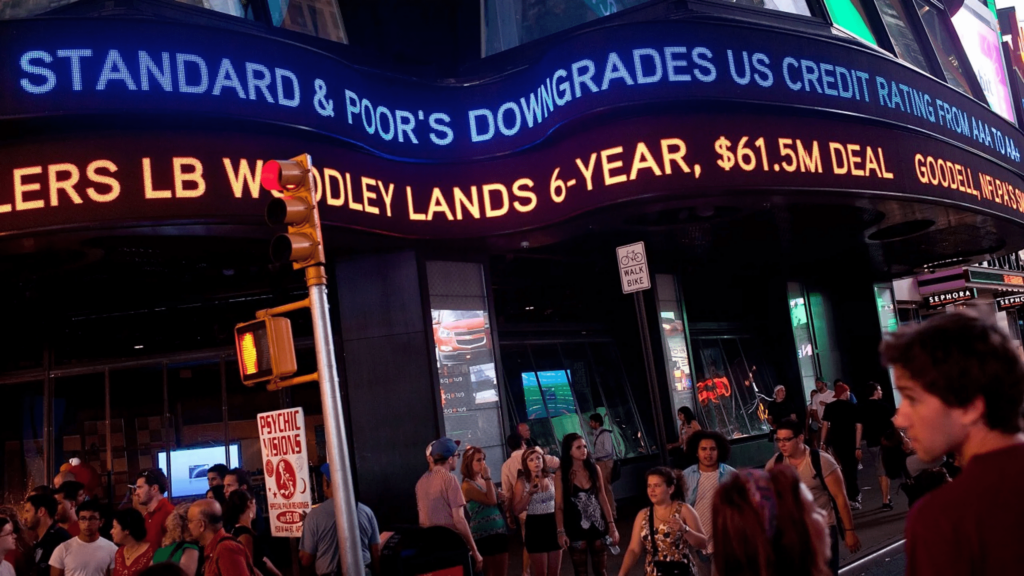Digital Zeitgeist – Unexpected Blow – Fitch’s Downgrade of the US Credit Rating Sparks Fury and Questions
In an unexpected twist to global economic expectations, Fitch, one of the leading international credit rating agencies, downgraded the credit rating of the United States from the pristine AAA to AA+ on Tuesday. This has spurred a passionate retort from the White House and sowed seeds of surprise in the investors’ camp. This controversial move marks the second time a major rating agency has stripped the US of its vaunted triple-A rating, Standard & Poor’s being the first.
The grounds for this downgrade, as cited by Fitch, were the projected fiscal deterioration over the next three years, and the recurrent, eleventh-hour debt ceiling negotiations that jeopardise the government’s capability to pay its bills. This news triggered a slide in the dollar across various currencies, a downward tick in stock futures and a rise in Treasury futures.
To provide a backdrop, Fitch had initially highlighted the potential for a downgrade back in May amidst the tumultuous US debt ceiling negotiations. It stuck to its stance even after the crisis was averted in June, with an intent to resolve the review by the third quarter of the year.
This is despite President Joe Biden and the Republican-majority House of Representatives brokering a debt ceiling agreement two months ago, thereby increasing the government’s borrowing limit from a staggering $31.4tn. The agreement had promised to suspend the debt limit until January 2025.
Fitch, however, perceives a “steady deterioration in standards of governance over the last 20 years, including on fiscal and debt matters”. The agency maintains that “repeated debt limit political standoffs and last-minute resolutions have eroded confidence in fiscal management”.
A disapproving Janet Yellen, the US Treasury Secretary, challenged Fitch’s downgrade, deeming it “arbitrary and based on outdated data”. Echoing a similar sentiment, the White House also declared its strong disagreement, stating it “defies reality to downgrade the United States at a moment when President Biden has delivered the strongest recovery of any major economy in the world,” as communicated by White House Press Secretary Karine Jean-Pierre.
Credit ratings are key tools that investors utilise to gauge the risk profile of governments and corporations raising funds in the debt capital markets. Lower ratings often lead to higher financing costs, making this downgrade an ostensibly worrying development. However, the actual market impact remains ambiguous.
In 2011, amidst another debt ceiling crisis, Standard & Poor’s snipped the US’s top AAA rating by a notch, days after a debt ceiling deal was brokered. They cited political polarisation and insufficient measures to rectify the nation’s fiscal outlook. This time around, after Fitch’s announcement, Treasury 10-year futures displayed an upward trend, hinting at a lower yield, while the dollar dipped against a spectrum of key currencies.
The memory of the aftermath of the 2011 downgrade lingers, when US stocks spiralled down, and the rating cut repercussions bled into global stock markets already grappling with a financial meltdown in the eurozone.
However, many, like Ed Mills, an analyst at Raymond James, expect the market’s response to this announcement to be muted. A sentiment shared by Mohamed El-Erian, President at Queens’ College, who stated, “Overall, this announcement is much more likely to be dismissed than have a lasting disruptive impact on the US economy and markets.”
Playing the Devil’s Advocate, one might question the credibility of these rating agencies, especially when considering Yellen’s comments about the downgrade being based on outdated data. After all, these organisations are not infallible and have been known to err, as exemplified by their failure to predict the 2008 financial crisis.
Furthermore, political tension and negotiations are part and parcel of a robust democratic process. Disagreements and debates might be chaotic, but they also indicate an active democratic framework. An alternative perspective might therefore suggest that frequent debt ceiling negotiations, rather than signalling a country’s inability to manage its debts, are indicative of checks and balances at work.
In conclusion, while the downgrade may have created a flutter, the real-world impact might be considerably more muted than many fear. It seems a resilient US economy has evolved to be more impervious to these ‘ratings shocks’ than in times past. Time, indeed, will tell whether the bearish outlook of Fitch will reflect in the US’s economic reality or fade away as just another headline.
Disclaimer: The views and opinions expressed in this article are those of the author and do not necessarily reflect the official policy or position of GPM-Invest or any other organisations mentioned. The information provided is based on contemporary sourced digital content and does not constitute financial or investment advice. Readers are encouraged to conduct further research and analysis before making any investment decisions.

